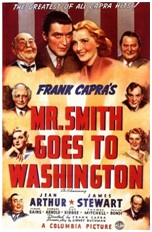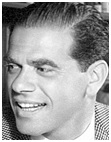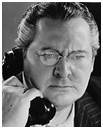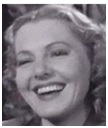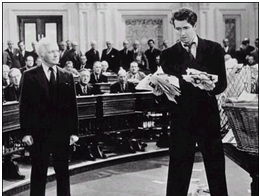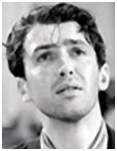|
 |
|
 |
|
|
||
Mr. Smith Goes to Washington - Success, Leadership and
Ethics
Mr. Smith Goes to Washington (1939)
Famous for... Director, Frank Capra, teaming up with his favourite actors:
Set in... America in the late 1930’s.
Director Frank Capra (pictured right, also director of It's A Wonderful Life).
Oscars One for original story (Gone with the Wind won most of the Oscars).
Key characters Jefferson Smith (James Stewart), newly appointed American senator. Clarissa Saunders (Jean Arthur), his secretary (pictured right with Smith). Joseph Paine (Claude Rains, also a star of Casablanca), American senator. Diz Moore (Thomas Mitchell, also a star of It’s A Wonderful Life).
The governor of an unnamed American state, Hubert Hopper, has to replace a recently deceased senator. His corrupt political boss, Jim Taylor (pictured right), wants him to appoint one of his supporters. But he goes for Jefferson Smith , head of the Boy Rangers (similar to boy scouts) and heroic extinguisher of a recent forest fire. Hopper thinks that his clean image and political naivety will make him easier to manipulate. Smith is helped by the state’s other senator, Joseph Paine (pictured right), whom he greatly admires because of his friendship with Smith’s dead father. He doesn’t know that Paine is also a corrupt supporter of Taylor. When Smith arrives in Washington, he stares in awe at its monuments and government buildings including the: a) Supreme Court (where he reflects on its inscription “equal justice”) b) Lincoln Memorial (where he reflects on Abraham Lincoln's honesty and integrity). Smith’s ideals of freedom, democracy and morality win over his cynical secretary, Clarissa
Saunders (known as Saunders, below). She (pictured right) is captivated by his bill (proposed new law) to create a national boys’ camp in 200 acres of countryside in his state, where they can learn the American ideals of liberty and justice for all. But it is on the same site as a useless dam project that will greatly profit Taylor and Paine. So Paine produces evidence that Smith:
Smith is so shocked by Paine’s betrayal that he starts to go home. Saunders finds him at the Lincoln Memorial, where he reads the last sentence of President Lincoln’s 1863 Gettysburg Address: “And that government by the people for the people shall not perish from the earth”. Saunders re-kindles his belief in these words, persuading him to launch a filibuster (a long speech) to delay:
This speech gradually wins over the other senators, despite Paine’s ploy of bringing in bins of letters and telegrams from Smith’s state demanding his expulsion (all written by Taylor’s supporters) - pictured right above. After an exhilarating and idealistic twenty four hour speech (pictured right), Smith collapses. Paine is overcome by guilt, and his suicide attempt is thwarted by some other senators. Paine then:
Smith is now a hero.
Lessons for life and work
1. People and the individual first Smith successfully battles against the evils of:
It is no coincidence that his name is Jefferson, who enshrined in the American Constitution everyone’s right to life, liberty and the pursuit of happiness. Like in Frank Capra’s other films (such as It’s A Wonderful Life), Smith shows how one individual can defeat the rich, corrupt and powerful. In 1982 Frank Capra said his films were based upon three ideals:
Smith (pictured right) says that politics would be useless, if it wasn’t kind to people. In contrast Paine and Taylor’s lucrative dam project doesn’t provide water to the people who really need it.
2. Ideals inspire Inspired by President Lincoln (pictured right), the hearts of Clarissa Saunders and people everywhere are won by Smith’s ideals of:
3. Never give up hope Smith is inspired by:
4. Character boosts your confidence Smith stands up to Paine and Taylor, because he believes his principles are worth fighting for. This gives him confidence, resolution and energy. “Boy, I feel like a house on fire”, he says, even though he has been speaking for many hours.
5. Power and money corrupt Taylor is ruthlessly determined to destroy Smith, and Paine sacrifices his principles for money. 6. Honesty is the best policy Smith finally shames Paine into telling the truth.
8. Save the planet Smith loves the countryside and wants to protect it from unnecessary government building (like the dam project).
Key quote on government “Liberty is too precious a thing to be buried in books, Miss Saunders. Men should hold it up in front of them every single day of their lives and say I'm free to think and to speak”, Smith. Your friend Mr. Lincoln had his Taylors and Paines. So did every other man whoever tried to lift his thought up off the ground. Odds against 'em didn't stop those men. They were fools that way. All the good that ever came into this world came from fools with faith like that, Saunders (to Smith when he's thinking of going home).
Key quote on ethics Great principles don’t get lost once they come to light. They’re right here; you just have to see them again, Smith (in his long speech).
Key quote on management I wouldn’t give you two cents for all your fancy rules, if behind them, they didn’t have a little bit of ordinary, everyday human kindness – and a little looking out for the other fella, too, Smith .
Key quote on influence Dad always used to say the only causes worth fighting for were the lost causes, Smith (to Paine). Key quote on health Every time I think of exercise, I have to lie right down till the feeling leaves me, Diz Moore (Saunders’ journalist friend, pictured right).
Two film websites to recommend 1. filmsite.org (run by Tim Dirks). 2. aveleyman.com (run by Tony Sullivan) |
|
|
||
|
|
||
| Copyright © wisdomtowin.com 2025 All Rights Reserved | ||
|


